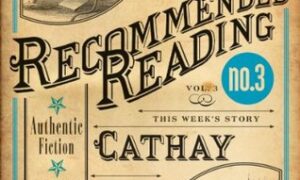 The Madwoman Upstairs by Catherine Lowell
The Madwoman Upstairs by Catherine Lowell
My rating: 3/5 cats



when i first heard about this book, i was delighted and thought, “someone has written a book just for meeeee!”
brontës?? check!
scavenger hint? check!
campus setting? check!
and yet.
the book is fine, but it did not delight. it’s being compared to Special Topics in Calamity Physics, and that’s a really good comparison, because that was another book i thought i would love like candy, but found to be a little twee; a little cutesie-pie, and not at all living up to its own comparison to The Secret History.
this book is about samantha whipple – the last living descendant of the brontë family. rumors abound about her having inherited an unspecified “something” desperately coveted by brontë scholars, and her own beloved father promised that one day she would be the recipient of the enigmatic “Warnings of Experience,” before he died in a fire when she was fifteen. now a plucky twenty-year-old, samantha heads off to oxford where she finds herself the object of much scrutiny – because she is american, because she is tall, because she is a little older than the rest of the first-years, because of who her father was, because of who her ancestors were, and because of this undisclosed treasure about which she knows nothing.
until she does.
after meeting with the banker handling her father’s estate, samantha receives a box containing a bookmark, which turns out to be the first clue in a treasure hunt that will eventually lead to those mysterious “Warnings of Experience.” at the same time, she is plagued by mysterious happenings while she is living alone in her isolated tower on campus. there are all sorts of gothic overtones as mysterious packages arrive on her doorstep, she feels people watching her every move, and then… enter the professor.
james timothy orville III is young, brooding, handsome, irascible, and in samantha’s private tutoring sessions with him, they butt heads in that typical romcom way that’s meant to endear them to us and ship for them oh-so-hard.
“Well, he said, and he smiled – almost. “Tell me about yourself.”
“No, thank you.”
and this relationship kind of took over the book for me, swallowing the gothic tone and redirecting it into something more breezy and insubstantial. it’s not unpleasant, but it lacks the weight of the jane eyre/rochester relationship it’s meant to echo, mostly because samantha is so frequently shut down by orville and retreats into silence and submission.
He was frowning. “What is the purpose of literature to you?”
He might have been asking me if I believed in God.
“English is the study of what makes us human,” I said. It was a phrase I had learned from standardized tests.
“Human biology is the study of what makes us human,” he said. “Try again.”
“English is the study of civilization.”
“History is the study of civilization,” he corrected.
“English is the study of art.”
“Art is the study of art.”
I let out a flush of air. “English tells us stories.”
“If you can’t think of anything intelligent to say, don’t say anything at all.”
I shut my mouth.
samantha’s kind of problematic as a character. she’s all over the place – she has a hesitancy and self-scrutiny that rivals that fifty shades chick (although more articulate) but other times she is able to hold her own against orville and show off the intellect she is supposed to have. part of it is probably down to her having been homeschooled, unevenly, by her father for her first fifteen years, which also accounts for some of her socialization issues, but it reads inconsistent, and the chemistry between her and orville is lacking.
it’s not what i expected, but it’s not painful or anything – there are some good brontë-isms, all madwomen in attics and mysterious fires and there is some interesting brontë family-spec i enjoyed exploring, and some charming turns of phrase:
–I didn’t know what to say. This was not a dorm room; this was the sort of place people dumped you when they secretly thought you were insane.
–This was not an office. It was a small library, two stories high, with thin ladders and impractical balconies and an expensive ceiling featuring a gaggle of naked Greeks. It was the sort of library you’d marry a man for.
–Her voice was brittle and high-pitched, just as it had been on the phone. It was what baby pea plants would sound like if they could talk.
it was just not the brontë scavenger hunt novel i’ve been waiting for.
here is where i address the three things that drew me to this book, and how they let me down in their execution:
the brontës:
yes, there is a definite focus on the brontës here. and a lot of it is fun/insightful/deftly-handled. but at the end of the day, the brontë with the most screentime is – anne.










not that there’s nothing to say about egg anne; it’s just i’ve personally never read her, and she’s generally overlooked when approaching that famed family.

my interest in the brontë sisters is measured thusly:
emily:

charlotte:

anne:

while “my” brontës factor into the story, they aren’t the main focus, so my anticipation of getting brontë fever was quashed a bit.
scavenger hunt:
the scavenger-hunt element is probably the most disappointing. this is no full-throttle romp from one clue to the next – it’s a much more casual, circuitous journey that lacks any of the puzzle-solving fun that’s usually a factor; where the reader gets to be a part of the experience.
campus setting:
this is indeed set on a campus. and it is also the part i enjoyed the most. there’s some really funny writing here, when directed at deflating the pretensions of academia.
“I’d like to talk to you about your essay,” said Orville.
“Sure.”
“It was – different.”
“That’s for sure.”
He didn’t answer, and I thought he might be thinking of how best to fire me from school. I had written this essay at four in the morning, when I had given the finger to thinking up a legitimate argument. Orville had asked me to analyze the use of windows in a novel that had nothing to do with windows. I decided to argue that windows were not windows at all; they were all that separated the savage moorland from the civilized home, Thrushcross Grange from Wuthering Heights, even Cathy from her own self-constructed identities. Windows were the barrier between this world and the next, a barrier as ill-defined as the boundary between the reader and the text itself. It was a bullshit parade, and I was the proud mayor. I used the phrases “Jungian realism” and “linear archetypes,” and congratulated myself on achieving a level of douchebaggery I had previously only witnessed in shampoo commercials for men.
and of course, orville loves it:
“It was one of the finest papers I have ever read from a student.”
and they’re off into bicker-banter mode and it’s all very

“I gather that you do not like what you wrote,” he said.
“It was idiotic,” I said. “Any fool can find obscure patterns in a novel, fabricate an intention behind it, and then trick people into believing it’s relevant. I call that intellectual narcissism.”
“I call that creativity,” Orville said. “The purpose of literature is to teach you how to think, not how to be practical. Learning to discover the connective tissue between seemingly unrelated events is the only way we are equipped to understand patterns in the real world.”
ooooh, will they or won’t they?
but still – the campus novel part of this definitely lived up to my expectations, and had i been more into anne, i would have dug the brontë bits more than i did, but even that was only a minor disappointment. the scavenger hunt, though… deeply unsatisfying right to the end, and its resolution requires a very large portion of suspension of disbelief sauce.
a cute book, but not one that lingers long in the heart.







